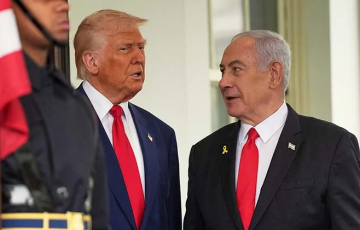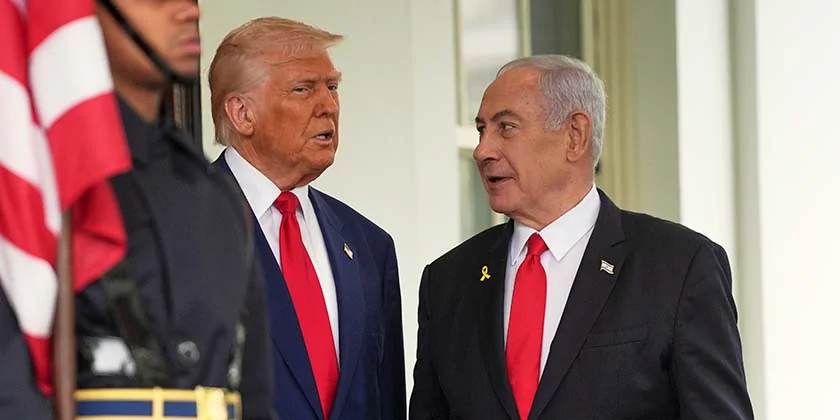"If The Iranian People See That The Regime Is Weak, They Can Take Matters Into Their Own Hands"
- 21.06.2025, 11:07
- 1,326

The former U.S. ambassador to Israel revealed a possible scenario for the development of the situation in the Middle East.
Few former or current U.S. officials understand the dynamics between the United States, Israel and Iran as well as former U.S. Ambassador to Israel Daniel Shapiro, writes "HaAretz".
He was at the epicenter of the 2015 Iran nuclear deal negotiations and subsequent tensions between Prime Minister Binyamin Netanyahu and then-U.S. President Barack Obama. He later participated in the Joe Biden administration's efforts to restart diplomacy on Iran's nuclear program and served as the Pentagon's key Middle East representative during the Gaza war and the accompanying regional escalation.
In the midst of the unprecedented military conflict between Iran and Israel, with U.S. involvement increasingly looking like a matter of time, Shapiro's views on the causes of what is happening and possible developments are particularly valuable. According to Shapiro, U.S. President Donald Trump is sticking to the clear and consistent line of previous U.S. policy: preventing Iran from obtaining nuclear weapons, and favoring diplomacy while keeping the military option on the table.
"The difference is that Iran has come very close to the threshold," he notes. - The IAEA has reported such a stockpile of uranium enriched to 60 percent (equivalent to 10 charges) that it can be brought to weapons grade in a very short time. There was also new evidence of progress on the weapons development itself."
Shapiro, now a senior fellow in the Middle East program at the Atlantic Council's Council for International Policy, believes that U.S. strikes against the Houthis in Yemen earlier this year forced Iran to take the threat of American military intervention more seriously, shortening the timeline for forcing Iran to begin negotiations.

"Usually the Iranians are very skillful at delaying even the start of negotiations. And here Trump started them right in April. He even surprised Netanyahu a bit during his visit by saying that negotiations were already underway. The problem is that the U.S. administration entered the negotiations without having defined the ultimate goal," he says.
"The first weeks and rounds of negotiations were accompanied by uncertainty, contradictory signals - whether it was acceptable for Iran to retain the enrichment capability. In the end, the Trump administration took a position of complete renunciation of enrichment, which Iran categorically rejected."
With the failure of Trump's attempts to find a compromise within 60 days - for example, through an international monitoring consortium - Shapiro believes that Netanyahu took this as a green light to launch military action.
"Very impressive and inventive."
This was the first potential crisis point between Trump and Netanyahu: would Israel really have struck Friday night before Trump's final approval?
Shapiro believes Trump was counting on more room for diplomacy. "There were talks with Iran scheduled for Sunday. But when Israel said: "We can't wait - they're too close and we're going to act," Trump had the opportunity to say no. He didn't. His signal was somewhere between a yellow light and a green light."
"He was very cautious at first. Initial statements emphasized that this was a unilateral Israeli action, the U.S. distancing itself so as not to give Iran an excuse to attack U.S. forces. But how it would go - it was unclear."
Although no one doubted the U.S. was ready to defend Israel, Shapiro notes that it wasn't until after Israel's first successful strikes that Trump decided to "jump on the train" and join the operation. While the strikes have not yet eliminated Iran's nuclear or missile capabilities, Shapiro considers them "quite successful, impressive and imaginative."
"The question is whether this success and potential U.S. involvement in destroying the Fordow site will lead to the primary goal of eliminating the ability to enrich and produce nuclear weapons." He believes this could be achieved both militarily - with U.S. involvement or with as yet unknown Israeli designs - and diplomatically, if the threat of U.S. intervention encourages Iran to be more flexible.
In his career, Shapiro has repeatedly watched Netanyahu clash with U.S. governments and Israel's own military and intelligence establishment over the timing of a possible strike on Iran.
"There is a consensus in Israel that Iran poses an existential threat and should never possess nuclear weapons. But opinions differed on whether the 'moment of truth' had arrived," he said. - Previously, Netanyahu had been more militarily inclined than his security establishment."
When he persuaded U.S. officials, congressmen, and the administration of this, "there were other voices from Israel. No one undermined his policy, but when asked for a professional assessment, the answer was: there is still time."
After Oct. 7, Shapiro believes that changed. "The psychology of Israeli society, political and military leadership is now similar: we can no longer tolerate what we used to tolerate." Netanyahu approached Trump with no internal opposition - all responsibility for support, cover or diplomacy rested with the US president.
"Trump made it clear that he would provide defensive support and began to see how things would go. It is difficult to compare this situation with previous ones: Iran's nuclear program is different here, and the situation after October 7. Iran also behaved differently in the negotiations."
One of the most significant episodes is the 2015 JCPOA (Joint Comprehensive Plan of Action), which Trump abandoned in 2018.
When asked whether we would have come to the current crisis if Trump had not pulled out of the deal, Shapiro replies: "Probably not." But unlike his critics, he offers a more complex picture.
"I've always said to skeptical Israelis: the JCPOA is not a solution. It didn't solve anything. It bought time and postponed the problem. We are now in the seventh year of the 10 to 15 years for which the calculation was made."
"It is during this period that Iran would have had the opportunity to shorten the distance, some of the restrictions would have been lifted. My view has always been that by this point it would have to either extend the agreement or threaten military force to prevent the crisis we face today."
Although the crisis has worsened since Trump's withdrawal and Iran's violations of the deal, Shapiro emphasizes: "It was built into the agreement from the beginning that we could face an unconstrained Iran seeking a breakthrough."
"The Iranian regime is the source of the problem."
While working at the Pentagon under the Biden administration, Shapiro was involved in the creation of a regional defense network that allowed Israel to repel Iranian missile attacks in April and October 2024. His appointment came shortly after the largest joint U.S.-Israeli exercise in history.
Even amid the unprecedented level of cooperation, he was surprised by some of Israel's operations in recent days. "Some aspects of the Israeli campaign were kept secret, they could only be assumed. Israeli capabilities cannot be underestimated - but they have exceeded expectations, perhaps even their own."
He considered "amazing" the combination of precise intelligence, deep infiltration and military might, and Israel's achievement of air supremacy within 48 hours - "far beyond their calculations."
Israel managed to hit above-ground nuclear facilities, but failed to prevent the launch of a large number of Iranian ballistic missiles. That was expected, as was the unresolved question of how to attack underground Fordow without U.S. bombs to destroy the bunkers.
"I don't rule out that there could be a different approach," he says, recalling Israeli ingenuity in Lebanon and Syria. "But the question of the need for U.S. involvement has always been at the center of assessing a possible campaign."
The goal of the current operation, Shapiro says, is not to topple the regime in Iran. Nevertheless, he adds: "The regime's ideology, the desire to destroy Israel, the network of proxy forces, the suppression of its own people - this is the root of the problem. Such a regime cannot be allowed to have nuclear weapons."
"The end of this regime will be a good day, whenever and however it comes. The Iranian people themselves will most likely do it."
"We should not rule out the possibility that if Iranians - and many of them hate the regime for its brutality, corruption and squandering resources on terrorist adventures - see the regime weakened by Israeli strikes and the institutions of suppression undermined, they may take matters into their own hands."
The next 24 hours will be crucial to the question of possible direct U.S. involvement. Shapiro notes that Trump, "in his usual fashion, is sending conflicting signals." "Maybe that has had an impact on Iran. The logic behind it is strange, but it might work." He said the US is preparing forces to strike Fordow if Trump decides to act.
"This could be leverage to force Iran to change course. He's preparing a military option, but in parallel he's saying he's ready to send [special envoy] Steve Whitkoff on another attempt to make a deal - and he likes deals."
Besides the unknowns with Trump and Iran, another question remains: does Israel have an alternative to U.S. involvement with Fordo? Meanwhile, Shapiro warns: Iran could expand the conflict by hitting Gulf countries, oil infrastructure or shipping in the Strait of Hormuz.
"The president will have to consider these risks when deciding on the military option," he concludes.











